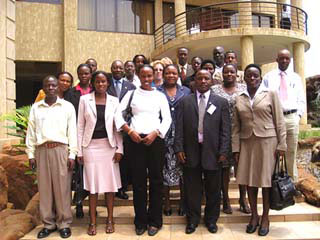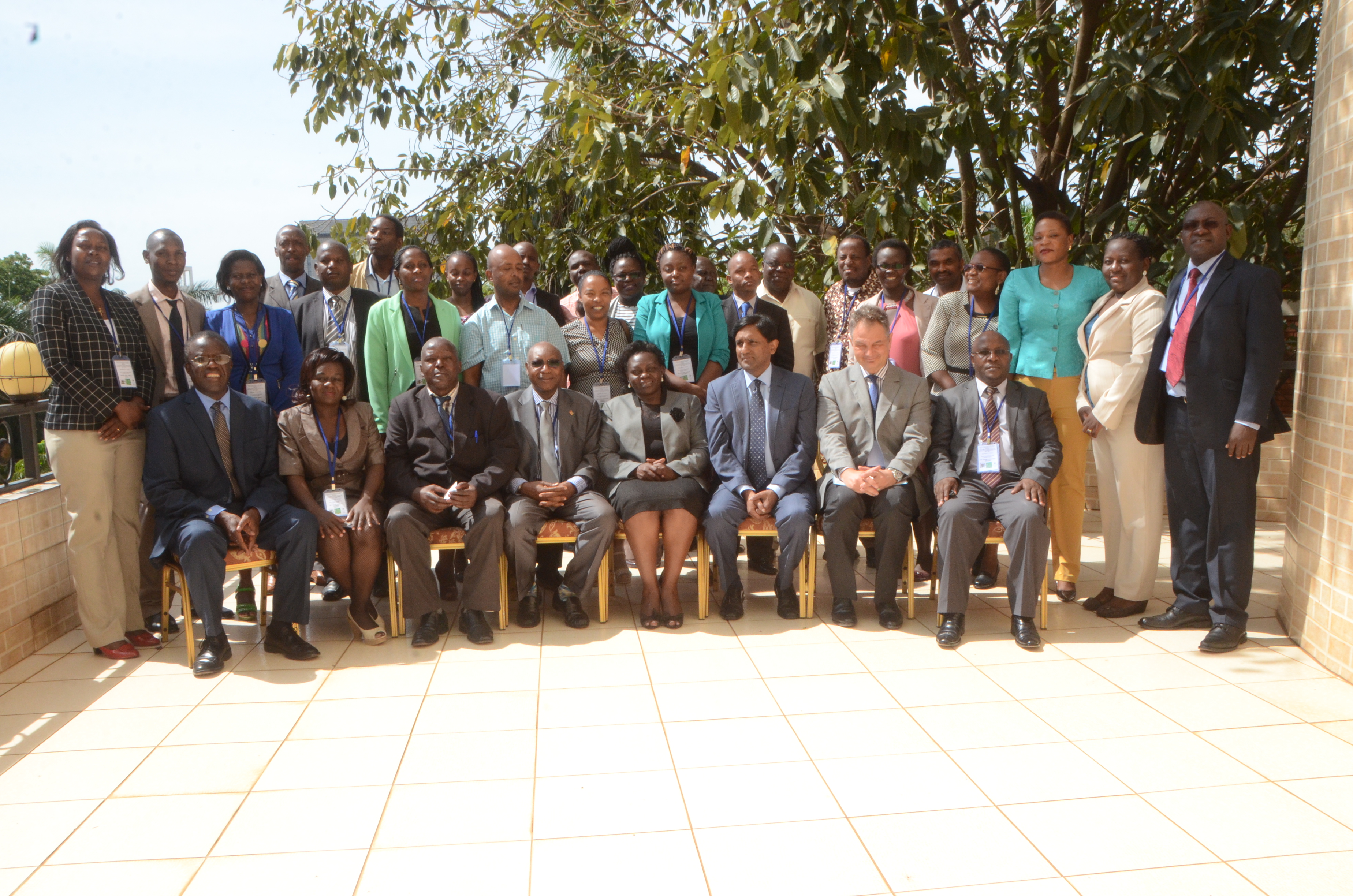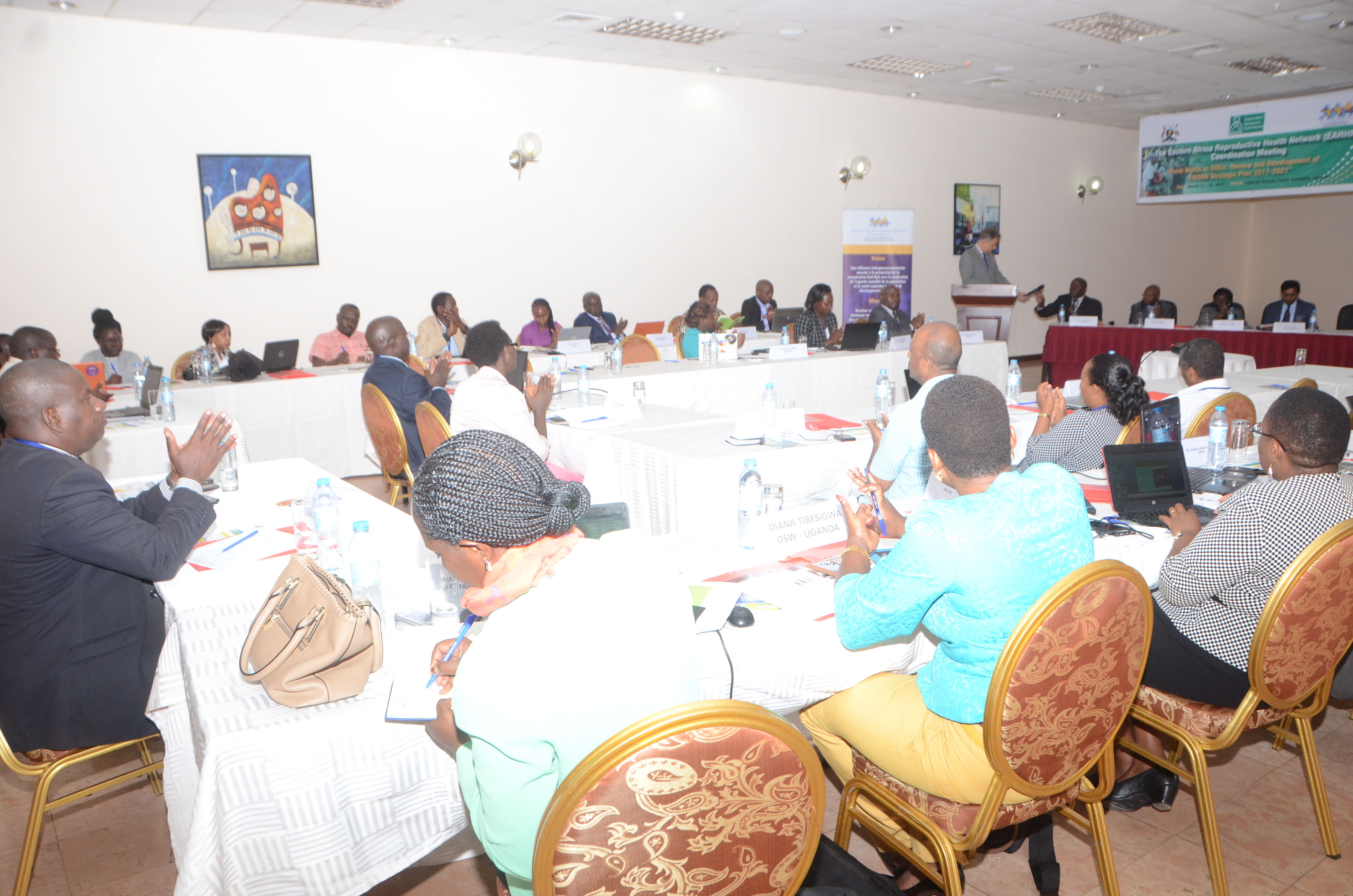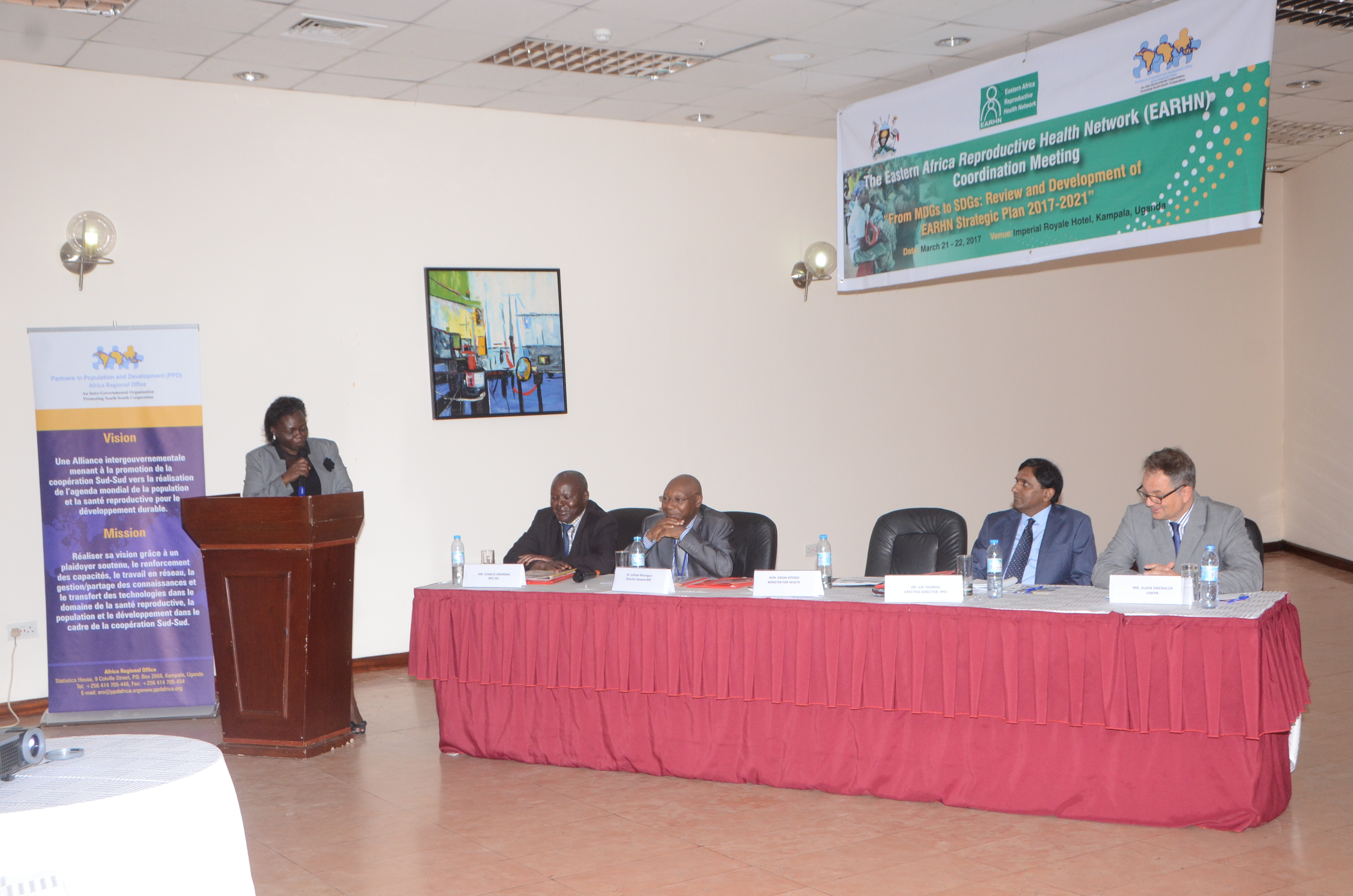 The Eastern Africa Reproductive Health Network (EARHN) is a South-South network comprised of government ministries addressing population issues. Its geographical coverage includes Burundi, Ethiopia, Kenya, Rwanda, Tanzania, and Uganda.
The Eastern Africa Reproductive Health Network (EARHN) is a South-South network comprised of government ministries addressing population issues. Its geographical coverage includes Burundi, Ethiopia, Kenya, Rwanda, Tanzania, and Uganda.
Additional and specific information on EARHN’s activities and meetings can be found at its website, http://www.earhn.org/
EARHN was founded in 1996 by members in Kenya, Tanzania, and Uganda. In December 2007, the Eastern Africa Reproductive Health Network met to re-invigorate its work and develop a Strategic Plan for 2008-2012.
Eastern African countries share similar social, political, demographic and geographic environments. EARHN believes that South-South cooperation has untapped potential for approaching new opportunities and sharing good practices in the field of sexual and reproductive health and rights (SRHR). Eastern African countries have extensive experiences in SRHR; these good practices and experiences offer a set of known lessons on which to build a new, collaborative effort to initiate change in-country and regionally, in order to improve the health and rights of all people, and in particular, the SRHR status of women and youth. EARHN will build upon the experiences of members within and outside of the network to build a collaborative effort to create positive change in both policy and programme implementation within Eastern Africa.
 EARHN’s vision is “an Eastern African region free from sexual and reproductive health burdens.” The mission of EARHN is “to Promote sound sexual and reproductive health policies and programmes across borders through strategic partnerships, effective coordination and sharing of critical information, experiences and expertise.” EARHN works through strategic partnerships, effective coordination and sharing of critical information, experiences and expertise. In order to attain its vision, carry out its mission and fulfil its mandate, EARHN has agreed on three areas of strategic focus: Advocacy and Coalition Building; Programme Development and Expansion; and Institutional Strengthening.
EARHN’s vision is “an Eastern African region free from sexual and reproductive health burdens.” The mission of EARHN is “to Promote sound sexual and reproductive health policies and programmes across borders through strategic partnerships, effective coordination and sharing of critical information, experiences and expertise.” EARHN works through strategic partnerships, effective coordination and sharing of critical information, experiences and expertise. In order to attain its vision, carry out its mission and fulfil its mandate, EARHN has agreed on three areas of strategic focus: Advocacy and Coalition Building; Programme Development and Expansion; and Institutional Strengthening.
Advocacy and Coalition Building. EARHN will act as the link between policymakers and technical officers in different countries to advocate for stronger SRHR policies and laws. EARHN will convene and support the more effective involvement of civil society, NGOs and the private sector in policymaking and the provision of RH services and also collaborate with other existing networks in sub-Saharan Africa to avoid duplication of efforts and wastage of scarce resources.
Specific efforts will be made by EARHN to work with the East African Community (EAC) and negotiate the potentially overlapping mandates between the EAC and EARHN. The EAC has agreed to work with EARHN to synergise efforts and increase the impact of both networks in implementing their programmes.
EARHN will build upon its members and partners’ experience in order to enhance political commitment and forge strong coalitions across programmes, sectors, professions, and countries.
Programme Development and Expansion. EARHN has identified the lack of programmes and collaboration between and across Eastern African countries as a significant limitation to the network. South-south cooperation has untapped potential for approaching new opportunities and sharing good practices in SRHR.
Success stories and good practices within East Africa and other developing areas are not as widely disseminated as they should be. EARHN believes that a sustained exchange of ideas, experiences and technologies from within the region will enhance policies and programmes through south-south cooperation with the least expense and maximum efficacy. EARHN sees the need not to focus only on the sharing of precise knowledge of effective policies and programmes, but also on the health systems that must deliver them.
Institutional Strengthening. In order for EARHN to assist members in effectively operationalizing and implementing programmes, she will develop her own internal capacity, through a more formalized structure of governance and staffing.
EARHN will mobilize resources, develop and implement annual work plans and budgets for the network and to carry out planned activities. Regular coordination and reviews will ensure that EARHN stays the course of institutional strengthening.
Download EARHN Strategic Plan: earhnstrategicplan.pdf
Seventh Eastern Africa Reproductive Health Network (EARHN) Coordination Meeting, 2017, Kampala, Uganda.
Partners in Population and Development Africa Regional Office (PPD ARO) organized a two day Eastern Africa Reproductive Health Network (EARHN) Coordination meeting on 21-22nd March 2017 at Imperial Royal Hotel in Kampala. The meeting agreed on a common understanding of the RH/FP situation and challenges in the Eastern Africa Region in the context of the SDGs; reviewed the EARHN 2012 – 2016 Strategic Plan, developed a draft successor Strategic Plan for the period 2017–2021; and developed recommendations for effective coordination of the network.
EARHN is a south-south advocacy network that was formed by Uganda, Kenya and Tanzania in 1996 with the aim of contributing to improved policy, funding and visibility of RH/FP within the Eastern Africa countries. Membership has since expanded and currently includes Rwanda, Burundi, Ethiopia and South Sudan, making up in total 9 countries with hopes of extending the reach to the rest of the Horne of Africa.
In total 45 participants from the 9 member countries attended the meeting. These were mainly focal persons, technical people drawn from the Ministries of Health and Planning, non-state partners implementing RH/FP programmes, and other like-minded stakeholders in the region including key CSO representatives. The meeting was covered by four media outlets including the regional East African.
The, Executive Director, Partners in Population and Development (PDD); Dr Joe Thomas, UNFPA Representative; Mr. Alain Sibenaler, the Director General, National Population Council of Uganda; Dr. Jotham Musinguzi made key note addresses at the meeting which was officially opened by the Minister of State for Health (PHC); Hon. Sarah Opendi. In her address, the minister stressed the need to implement the many policies and strategies that are put in place in order to facilitate the work of bringing higher up to scale issues of reproductive health including family planning. She noted that successful implementation of these progressive SRHR commitments is still impeded by lack of political will, inadequate funding for SRHR programmes, inadequate partnerships and coordination with and among local actors and international organizations.
At the end of the meeting, participants and country focal persons stressed the need for adapting EARHN‘s Strategic Positioning, Focus, Strategic Objectives and Interventions to ensure alignment with SDGs. They underscored the vital role and need to strengthen Monitoring, Evaluation and Reporting of Programme Performance. EARHN’s Strategic Positioning. They reviewed old strategic focus, objectives & interventions and made strong recommendations for the new implementation strategy, stressing monitoring, evaluation and reporting mechanisms for the successor EARHN Strategic Plan, 2017 – 2021.
Additional documents and photographs from the meeting are available online at the links below:
UNFPA_MDGs_reflections_on_the_performance_of_Eastern_Africa_countries
Uganda_registers_great_improvement_in_RH_Uganda
South_Sudan_Overview_of_Progress_SRH_implementation
Rwanda_Remaining_RH_Challenges
KENYA_Reflection_on_RH_Challenges_achievements
Ethiopia_From_MDGs_SDGs_Remaining_challenges_to_implementation
Sixth Eastern Africa Reproductive Health Network (EARHN) Coordination Meeting, 2013, Addis Ababa, Ethiopia
The Federal Ministry of Health of Ethiopia jointly with Partners in Population and Development Africa Regional Office (PPD ARO) organized the Sixth Annual Eastern Africa Reproductive Health Network (EARHN) meeting held from March 5-9, 2013, at Harmony Hotel, Addis Ababa, Ethiopia.
This was the Sixth in a series of EARHN Coordination meetings that are held annually.
The objectives of the coordination meeting were to:
- Share experiences, progress, achievements and challenges in the implementation of the EARHN Strategic Plan in-country;
- Report on the country commitments at the London FP summit, progress made so far and next steps to ensure realization of these commitments at country level
- Develop country advocacy plans using a smart chart for full realization of London FP Summit country commitments
A number of key documents from the meeting are available online by clicking on the link below:
http://www.earhn.org/meetings/meetings2013/
2012 Workshop on Capacity Building in Addis Ababa, Ethiopia
Information, presentations, and materials from this meeting are available at: http://www.earhn.org/meetings/2012ethiopia/
2011 Study Tour in Ethiopia
In 2011, EARHN met again in Addis Ababa, Ethiopia to learn how to use the advocacy planning tool of Spitfire, as well as to learn lessons from Ethiopia’s Health Extension Programme. Reports from the 2011 Ethiopian Health Extension Programme Study Tour and the 2011 Spitfire Training Meeting are available at: http://www.earhn.org/meetings/2011-study-tour/
2011 EARHN Meeting in Kampala, Uganda
The Fourth Eastern Africa Reproductive Health Network (EARHN) Coordination Meeting: “Repositioning Family Planning/Reproductive Health in the Eastern Africa Region”
Date: April 28-30, 2011
Venue: Speke Resort Munyonyo, Kampala, Uganda
Partners in Population and Development Africa Regional Office (PPD ARO) together with the Population Secretariat Uganda (POPSEC) and Marie Stopes International jointly organized the Fourth Annual Eastern Africa Reproductive Health Network (EARHN) meeting. The meeting was held from April 28 – 30, 2011, at Speke Resort Munyonyo, Kampala, Uganda. The theme of the meeting was “Repositioning Family Planning/Reproductive Health in the Eastern Africa Region”. This meeting started after a two-day strategic planning review meeting from April 26-27 in which technical people from the region met and agreed on a strategic framework for the years 2012-2016.
The main objectives of the meeting were to create a common understanding of the Family Planning and Reproductive Health (FP/RH) situation and challenges in the Eastern Africa Region; to network and galvanize efforts for increased advocacy, leadership and stewardship on issues of FP/RH among parliamentarians and other champions; and to have consensus on policy and strategic actions to address FP/RH in the region.
Participants to the meeting were parliamentarians, FP/RH potential champions and other high level personalities who had been very active in advocacy and promotion of family planning and reproductive health. They were drawn from the countries of Uganda, Kenya, Tanzania, Rwanda, Burundi, and Ethiopia. The Government of South Sudan, Malawi and Ghana attended as observers.
Participants discussed and reflected on Reproductive Health and Family Planning challenges in the Eastern Africa Region and came up with concrete solutions to address the challenges. In addition, policy makers and technical people pledged to take concrete steps to ensure that every birth is wanted, every pregnancy is healthy and every delivery is safe and that we have provided the means to enable this to happen. No woman should die while giving life.
A number of key documents from the meeting are available online by clicking on the links below:
Agenda: Agenda.pdf
Day 1 Presentations
Dr. Kyaddondo’s Presentation on EARHN Highlights: EARHN.pdf
Dr. Kyaddondo’s Report on Uganda’s Progress: Kyaddondo.pdf
Mr. Oisebe’s Report on Kenya’s Progress: Oisebe.pdf
Mr. Masatu’s Report on Tanzania’s Progress: Masatu.pdf
Mr. Mbontintwali’s Report on Rwanda’s Progress: Mbonyintwali.pdf
Day 2 Presentations
Mr. Musoke’s Presentation on the review of the EARHN Strategic Plan: Musoke.pdf
Day 3 Presentations
Dr. Oketcho’s Presentation on Capacity Plus: Oketcho.pdf
Mr. Chekweko’s Presentation on Commodity Security: Chekweko.pdf
Ms. Mercedes’ Presentation on Advocacy for RH Supplies: Mercedes.pdf
Mr. Mberu” s Presentation on Contribution of Family Planning: Mberu.pdf
Day 3 Presentations
Mr. Sempabwa’s Presentation on Repositioning Family Planning in Rwanda: Sempabwa.pdf
Mr. Ethuro’s Presentation on Repositioning Family Planning in Kenya: Ekwee.pdf
Dr. Malek’s Presentation on Repositioning Family Planning in Sudan: Malek.pdf
Dr. Musinguzi’s Presentation on Family Planning Champions: Mercedes.pdf
2010 EARHN Meeting in Kampala, Uganda
The Third Eastern Africa Reproductive Health Network (EARHN) Coordination Meeting: “Repositioning Family Planning and Reproductive Health in Eastern Africa”
Date: 2-3 2010
Venue: Imperial Royale Hotel, Kampala, Uganda
The meeting brought together technical people from government ministries and family planning champions (including Parliamentarians, religious leaders, media, and public figures) from six countries in Eastern Africa (Burundi, Ethiopia, Kenya, Rwanda, Tanzania, and Uganda).
By the end of the meeting, the family-planning champions in attendance pledged to take action in their countries to advance the reproductive health agenda domestically and regionally.
A number of key documents from the meeting are available online by clicking on the links below:
Agenda- agenda.pdf
Remarks by Regional Director Partners in Population and Development Africa Regional Office (PPD-ARO) by Mr. Abdelylah Lakssir, International Programme Office , PPD ARO- lakssir-PPDAROremarks.pdf
Official Opening by Hon. Eriya Kategaya, Deputy Prime Minister and Minister of East African Community Affairs- kategaya-opening.pdf
EARHN Strategic Plan by Dr. Betty Kyaddondo, Head, Family Health Department Population Secretariat, Uganda- EARHNstrategicplan.pdf
Family Planning in the context of the East African Cooperation Strategic Plan by Hon. Dr. Odette Nyiramilimo, Member of Parliament, East African Legislative Assembly (EALA)- odette-EALA-EAC.pdf
Advance Family Planning Project by Mr. Martin Ninsiima, Programme Officer, Centre for Communication Programs, Uganda- ninsiima-AFP.pdf
Concept of FP Champions by Mr. Patrick Mugirwa, Programme Officer, PPD ARO- mugirwa-FPchampions.pdf
Champions in Practice: The Family Health International (FHI) Experience by Ms. Patricia Wamala, Family Health International, Uganda- wamala-FHIchampions.pdf
FP Champions and Country level experience sharing
1. Burundi- Burundichampion.pdf
2. Ethiopia- Ethiopiachampion.pdf
3. Kenya- Please read the meeting report for a summary of the presentation
4. Rwanda- Rwandachampion.pdf
5. Tanzania- Tanzaniachampion.pdf
6. Uganda- Please read the meeting report for a summary of the presentation
EARHN Country reports
1. Burundi- BurundiEARHN.pdf
2. Ethiopia- EthiopiaEARHN.pdf and EthiopiaEARHN-2.pdf
3. Kenya- KenyaEARHN.pdf
4. Rwanda- RwandaEARHN.pdf
5. Tanzania- TanzaniaEARHN.pdf
6. Uganda- UgandaEARHN.pdf
Official closing by Hon. Jachan Omach- Minister of State for Finance, Planning, and Economic Development- General Duties- omach-closing.pdf
Report on EARHN by Dr. Betty Kyaddondo, Head, Family Health Department Population Secretariat, Uganda and the Secretariat for EARHN, from 2007-2010: EARHN2010/EARHNreport-2007-2010.pdf
2009 EARHN Annual Meeting
 EARHN organized a follow up meeting of Members of Parliament from five EARHN countries and technical experts/stakeholders from the reproductive health field at Golf Course Hotel in Kampala, August 28, 2009, with the following objectives:
EARHN organized a follow up meeting of Members of Parliament from five EARHN countries and technical experts/stakeholders from the reproductive health field at Golf Course Hotel in Kampala, August 28, 2009, with the following objectives:
- Review and evaluate the commitments MPs made during the August 2008 EARHN meeting.
- Adopt and disseminate policy briefs and raise awareness of internationally agreed frameworks.
- Further build momentum for MPs to commit and advocate for RH supplies and SRH.
By the conclusion of the meeting, participants agreed to five (5) resolutions:
- The Members of Parliament resolved to devise mechanisms where they are available at all the stages of the budget process, especially at the initial stage of planning to ensure community input to the budget priorities as well as determine and fix the actual budget requirements and figures before presentation to the cabinet.
- More effort in the past has concentrated at mobilizing and re-appropriation of resources. It is high time the focus of the MPs shifted towards the management of the resources. The relevant committees of parliament together with the Executive should effectively monitor the level of distribution and spending on the health budget as well as monitor the impact on health and health care performance associated with increasing health budget to the Abuja commitment of 15% of the national budget.
- Fight corruption at all levels.
- There has been a tendency of donors giving countries commodities that may not be urgently required. Country specific contraceptive needs should be prioritized so that donors align their financial and technical assistance to national policies, plans and needs.
- Strengthen mechanisms to further foster community engagement and empowerment in the contraceptive agenda in partnership with the private sector, media, CBOs and CSOs.
EARHN Study Tour to South Africa
2-11 June 2008
Organized by the Department of Social Development, South Africa
 Aim
Aim
Based on the EARHN Strategic Plan, the EARHN – South Africa study tour, aimed at providing an opportunity for EARHN member countries to share experiences and find lessons learnt in South Africa from their successful work in population, reproductive health and development. It also aimed at promoting international co-operation between SADC and EARHN member countries. The EARHN members who traveled to South Africa saw for themselves what should and can be done in response to these challenges to health and welfare. The people and institutions in South Africa are responding in specific ways, but with lessons that can be translated to other countries and other cultures.
Objectives
The specific objectives of the study tour included:
1. Participation in the UAPS Southern Africa region meeting to discuss emerging population issues in the region.
2. Participation in the SADC meeting, where SADC member countries would buy into the idea of creating a Southern Africa Reproductive Health Network.
3. Visiting population and reproductive health centres of excellence to share experiences and learning with them for similar target groups/fields of interest.
4. Formation and strengthening networks and partnerships for future collaboration.
Overview
The tour that kicked off from participation in the UAPS meeting ran from the 2nd to the 11th of June 2008. Six participants from Ethiopia, Kenya, Tanzania and Uganda were hosted by the Department of Social Development. Five organizations were visited. The organizations visited involved those offering experience in reproductive health services, youth centres, health systems management, research collaboration centres and population and development offices. It was intended that the visits would provide a wide range of knowledge, experience and information; and the tours designed to give participants the chance to share learning from their own countries with each other and with the organizations that they visited.
Read the full study tour report
View photos from the study tour
2008 Coordination and Policy Meetings
Documents from the meetings can be found at: http://www.earhn.org/meetings/2008meetings/
2007 Strategic Plan Meeting
Information on the December 2007 meeting to develop the strategic plan can be found at: http://www.earhn.org/meetings/2007meeting/
Download EARHN Newsletter, September 2009
2″>Download EARHN’s 2009 policy brief: “Addressing Eastern Africa’s Dismal Health: A Call For Action”




Leave a Reply
You must be logged in to post a comment.